How to Stop Social Media Online Harassment
- Last Updated: June 12th, 2025

Attorney Jessie Paluch, founder of TruLaw, has over 25 years of experience as a personal injury and mass tort attorney, and previously worked as an international tax attorney at Deloitte. Jessie collaborates with attorneys nationwide — enabling her to share reliable, up-to-date legal information with our readers.
Legally Reviewed
This article has been written and reviewed for legal accuracy and clarity by the team of writers and legal experts at TruLawsuit Info and is as accurate as possible. This content should not be taken as legal advice from an attorney. If you would like to learn more about our owner and experienced injury lawyer, Jessie Paluch, you can do so here.
Fact-Checked
TruLawsuit Info does everything possible to make sure the information in this article is up to date and accurate. If you need specific legal advice about your case, contact our team by using the chat on the bottom of this page. This article should not be taken as advice from an attorney.
Key Takeaways:
- Online harassment is prevalent on social media, with over half of adults experiencing some form of abuse that can lead to significant emotional distress and adverse mental health outcomes.
- The legal landscape of social media harassment cases is complex, involving jurisdictional challenges, First Amendment considerations, and questions about platform liability under Section 230 of the Communications Decency Act.
- Parents can be held liable for their child's online harassment if they knew about the behavior and failed to intervene, encouraged it, or neglected their duty of care, with precedent cases establishing the importance of parental oversight and responsibility.
Overview of Social Media Online Harassment
On this page, we’ll discuss an overview of social media online harassment, challenges in prosecuting social media harassment cases, parental liability in social media lawsuits, and much more.
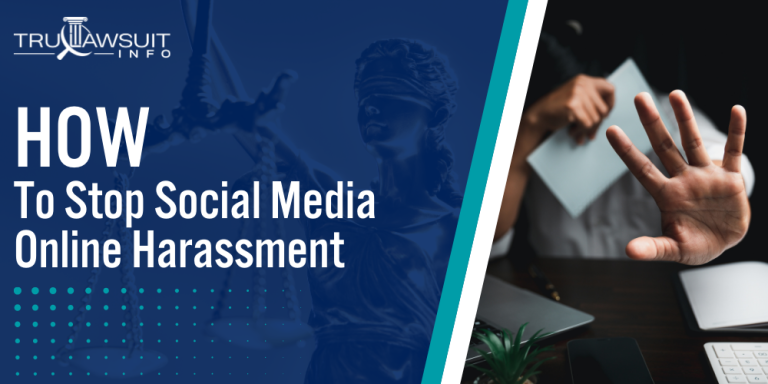
Intro to Social Media Online Harassment
Some of the key aspects of social media online harassment include, but are not limited to:
- Cyberbullying: Online harassment often takes the form of cyberbullying, which involves using digital platforms to send threatening, hurtful, or humiliating messages to a target.
- Stalking and Threats: Online harassers may engage in stalking behaviors, such as repeatedly sending unwanted messages or making threats of physical harm.
- Doxing: This involves publicly revealing someone’s personal information, such as their address or phone number, with malicious intent.
- Legal Remedies: Victims of online harassment may have legal options, such as filing a restraining order or pursuing a civil lawsuit against their harasser.
If you or a loved one has experienced severe online harassment on social media platforms, you may have legal options to hold the harasser accountable.
Contact TruLawsuit Info today using the chat on this page to receive an instant case evaluation.
Table of Contents
Prevalence and Impact of Online Harassment on Victims
Online harassment is prevalent across multiple social media sites, affecting people of all ages, genders, and backgrounds.
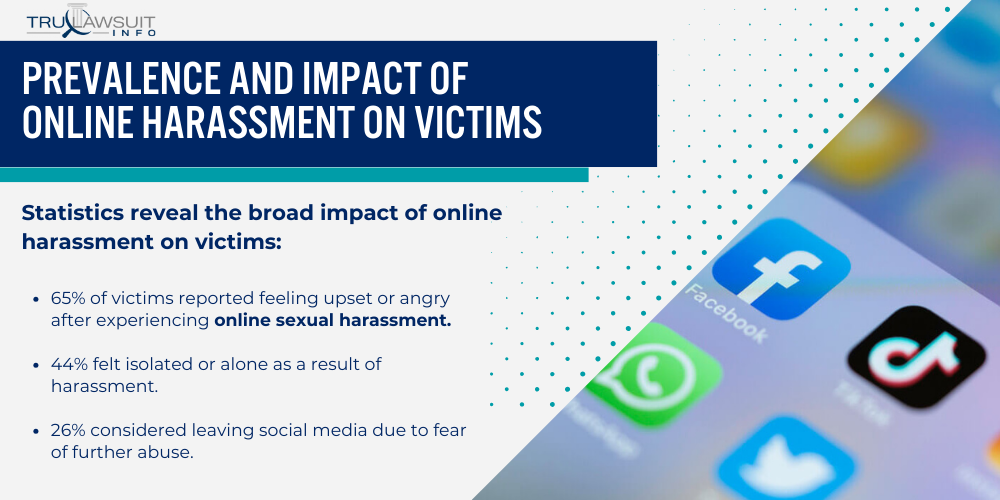
This widespread issue leads to considerable emotional and psychological stress for its victims, contributing to various negative outcomes.
Statistics reveal the broad impact of online harassment on victims:
- 65% of victims reported feeling upset or angry after experiencing online sexual harassment.
- 44% felt isolated or alone as a result of harassment.
- 26% considered leaving social media due to fear of further abuse.
Victims often experience a decrease in self-esteem and increased anxiety, and the impact can extend beyond the individual, affecting their friends, family, and broader community.
Legal Landscape of Social Media Harassment Cases
As social media use continues to grow, legal cases involving online harassment are becoming more frequent.
These cases often raise sophisticated issues related to jurisdiction, freedom of speech, and platform liability.
Courts find themselves in uncharted territory, requiring them to adapt traditional laws to fit the digital landscape.
The following are key legal aspects affecting social media harassment cases:
- Jurisdictional Challenges: Online harassment often spans state or national boundaries, complicating where and how cases are prosecuted.
- First Amendment Considerations: Some argue that internet harassment is protected as free speech, raising questions about where to draw the line.
- Platform Liability: Social media companies commonly rely on Section 230 of the Communications Decency Act (CDA) to avoid responsibility for user-generated content, impacting how cases are pursued.
Legal experts are exploring new strategies to address these challenges, balancing individual rights with public safety to ensure that victims of online harassment have a clear path to justice.
Circumstances Where Parents Can Be Held Liable
With the increasing use of social media among minors, concerns about parental liability in online harassment cases have grown.
Parents can be held accountable if their child engages in harmful online behavior, especially if they fail to take corrective action or encourage such behavior.
Conditions under which parents can be held liable for their child’s online harassment include:
- They knew or should have known about the harassment and failed to take reasonable steps to stop it.
- They encouraged or facilitated the harassment.
- They had a duty of care to protect their child and failed to do so.
- They were aware of harmful behavior but neglected to intervene.
Challenges in Prosecuting Social Media Harassment Cases
Prosecuting social media harassment cases can be challenging due to various factors.
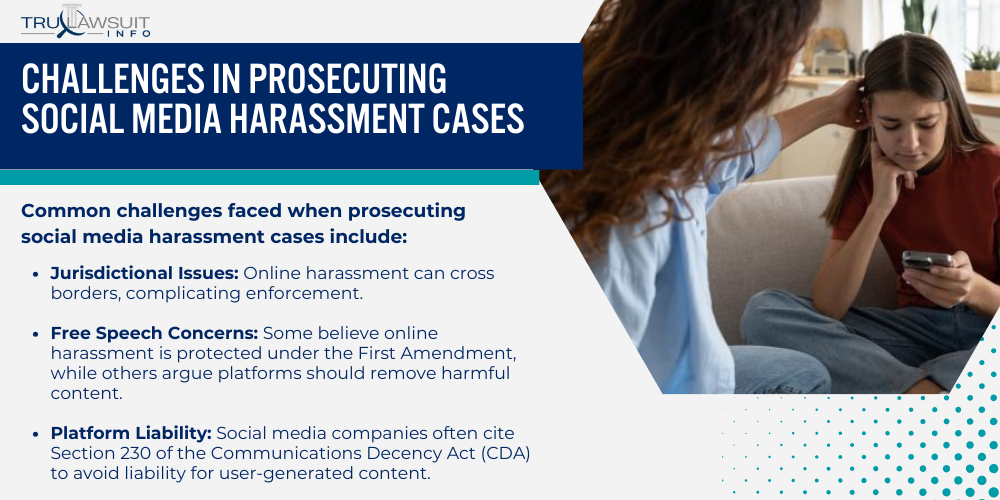
Jurisdictional issues arise when harassment crosses state or national boundaries, complicating law enforcement’s ability to investigate and prosecute offenders.
Common challenges faced when prosecuting social media harassment cases include:
- Jurisdictional Issues: Online harassment can cross borders, complicating enforcement.
- Free Speech Concerns: Some believe online harassment is protected under the First Amendment, while others argue platforms should remove harmful content.
- Platform Liability: Social media companies often cite Section 230 of the Communications Decency Act (CDA) to avoid liability for user-generated content.
- Difficulty in Gathering Evidence: Online harassment may involve anonymous accounts, making it hard to track perpetrators.
Existing Laws and Regulations Addressing Online Harassment
Several laws and regulations address online harassment, offering a legal framework to combat this issue.
These laws vary in scope and effectiveness, reflecting the diverse approaches taken by different jurisdictions to combat online life harassment.
Examples of laws and regulations targeting online harassment include:
- The Violence Against Women Act (VAWA) of 2013 addresses domestic violence, including cyberstalking.
- The Cyberbullying Prevention Act of 2011 targets cyberbullying and outlines penalties for those found guilty of the offense.
- California’s Anti-Bullying Laws aim to curb bullying, including online forms of abuse.
- International Legislation: Some countries have introduced specific laws to protect minors from online harassment and ensure social media platforms enforce compliance.
Precedent Cases Involving Parental Responsibility
Court cases involving parental responsibility in online harassment are growing, with some establishing precedents for holding parents accountable for their children’s actions.
These cases underscore the importance of parental oversight and highlight the potential legal ramifications when parents neglect their responsibilities.
Precedent cases where parents were held liable for their child’s online behavior include:
- In the 2019 case of Doe v. Archdiocese of Saint Paul and Minneapolis, parents were held liable for failing to prevent their children from engaging in cyberbullying.
- In the 2020 case of Smith v. Johnson County School District, a parent was found liable for not stopping their child’s online harassment.
- In another case, parents were penalized for not addressing their child’s repeated use of social media to harass peers.
If you or a loved one have experienced mental health issues after prolonged social media usage, you may be eligible to pursue compensation.
Contact TruLaw for a free consultation, or use the chatbot on this page for a free case evaluation to instantly see if you qualify for potential legal action.
Impact of Online Harassment on Victims
With the rise of social media, the frequency and severity of online harassment have escalated, profoundly affecting the well-being of countless individuals.
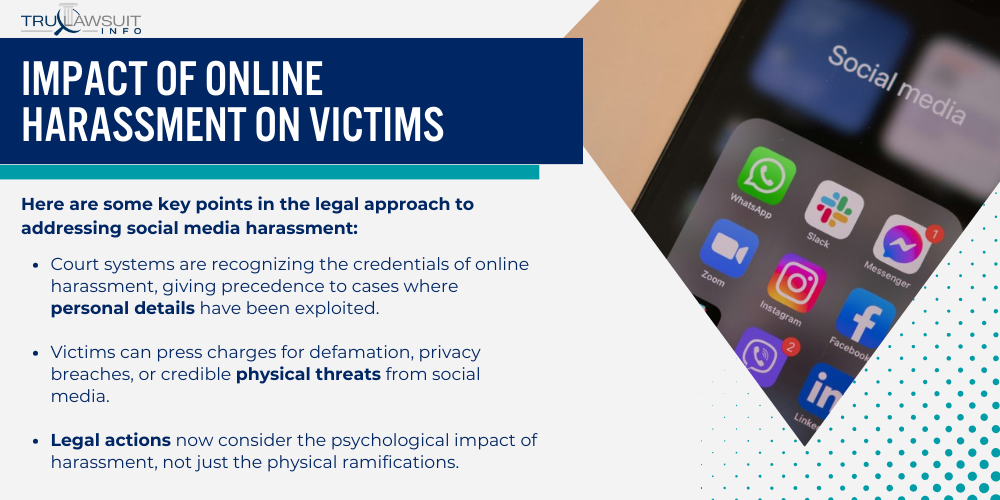
The accessibility of online accounts and personal details has made it easier for harassers to target and traumatize victims through threatening messages and physical threats, often resulting in the need for legal action and serious consequences.
Legal Landscape of Social Media Harassment Cases
The legal responses to online harassment are evolving to provide better protection for victims.
Here are some key points in the legal approach to addressing social media harassment:
- Court systems are recognizing the credentials of online harassment, giving precedence to cases where personal details have been exploited.
- Victims can press charges for defamation, privacy breaches, or credible physical threats from social media.
- Legal actions now consider the psychological impact of harassment, not just the physical ramifications.
- A difficulty arises in cross-jurisdictional cases, where harassers operate outside the victim’s home country.
Existing Laws and Regulations Addressing Online Harassment
Laws are adapting to address the nuances of harassment within the digital landscape.
Several existing laws and regulations have been established to curb online harassment.
Here’s what they cover:
- Many regions have laws that criminalize cyberstalking and bullying online to protect users’ online accounts.
- These regulations often cover direct messages that contain threats or hate speech.
- The sharing of non-consensual intimate imagery is increasingly being legislated against.
- Despite concrete laws, enforcement remains challenging, with platforms and police sometimes struggling to keep pace.
Challenges in Prosecuting Social Media Harassment Cases
Prosecutors face various hurdles when taking legal steps against online harassment.
Several challenges make it difficult to prosecute social media harassment cases.
Here are some of the key issues:
- Identifying and tracing anonymous harassers presents a significant obstacle, as they may utilize fake online accounts.
- The international nature of the internet means harassers can easily cross legal boundaries, complicating prosecution.
- Gathering sufficient evidence from online platforms to pursue a case requires thorough knowledge of digital forensics.
- Despite the impact of harassment, cases can be deprioritized compared to other crimes, delaying legal action and resolution for victims.
Parental Liability in Social Media Lawsuits
In the realm of social media, parents may find themselves entangled in legal challenges concerning their children’s online actions.
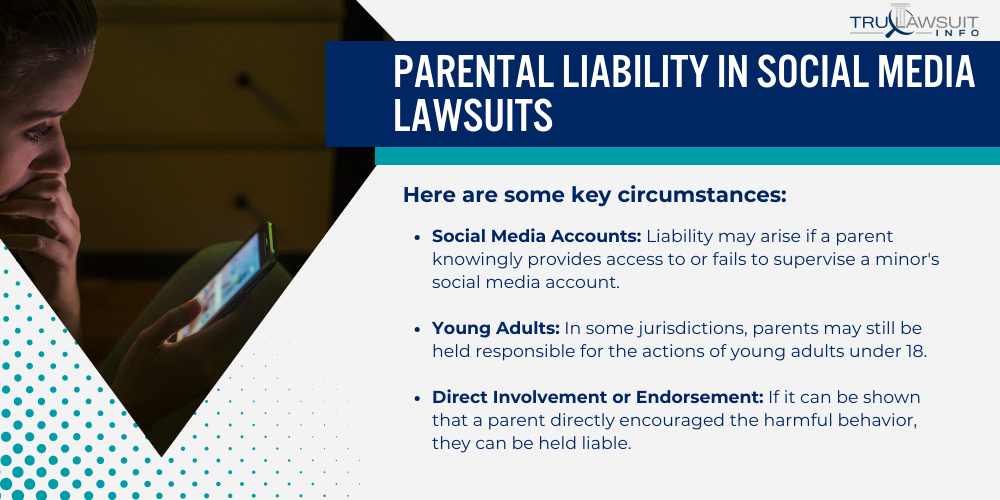
This section will discuss specific conditions under which parents could be held accountable in cases of online harassment and review relevant legal precedents.
Circumstances Where Parents Can Be Held Liable
It is essential to understand when parents can be held liable for their children’s online activity.
Here are some key circumstances:
- Social Media Accounts: Liability may arise if a parent knowingly provides access to or fails to supervise a minor’s social media account.
- Young Adults: In some jurisdictions, parents may still be held responsible for the actions of young adults under 18.
- Direct Involvement or Endorsement: If it can be shown that a parent directly encouraged the harmful behavior, they can be held liable.
- Negligence in Supervision: A demonstrated lack of reasonable oversight of the minor’s online activity could lead to parental liability.
Precedent Cases Involving Parental Responsibility
Several precedent cases shed light on the circumstances of parental liability.
Notable examples include:
- A case examining parental liability for cyberbullying highlighted the theories of parental responsibility and vicarious liability.
- The recognition of cases where adults assaulted minors following online interaction on platforms like MySpace has implications for parental supervision in the context of social networks.
- The concept of “Sharenting” has also sparked debates regarding children’s privacy and the extent of parental sharing.
- Another significant case involved a Missouri mom and acts of cyberbullying that stress the onus on parental guidance in preventing such incidents.
Proving Parental Negligence in Online Harassment Cases
When a child is harassed through social media, parental supervision is often scrutinized to determine any negligence.
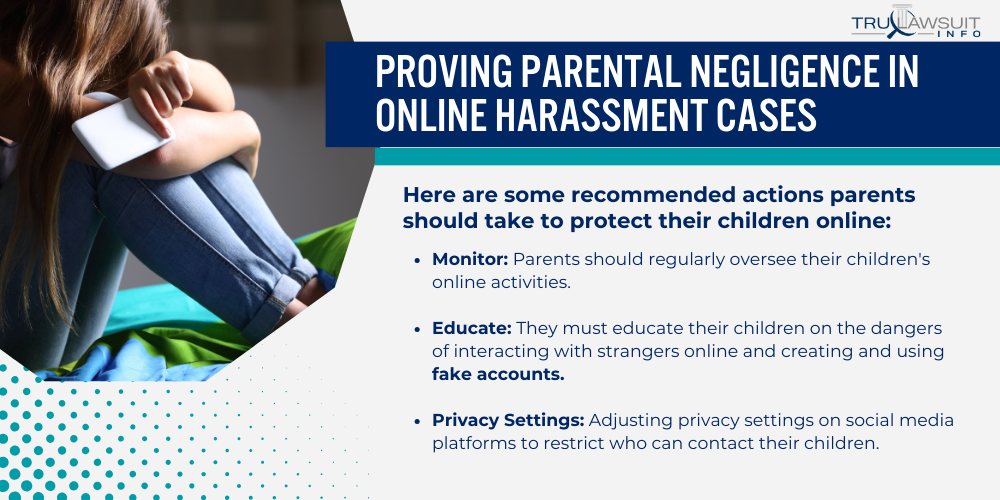
The courts may examine how the guardians managed their child’s online interactions, especially concerning fake accounts used for harassment.
Establishing a Duty of Care for Parents
Parents are legally obligated to protect their children from foreseeable harm, which extends to the digital environment.
The law expects parents to be aware of potential online risks, including social media harassment, and to take reasonable steps to shield their children from such threats.
Here are some recommended actions parents should take to protect their children online:
- Monitor: Parents should regularly oversee their children’s online activities.
- Educate: They must educate their children on the dangers of interacting with strangers online and creating and using fake accounts.
- Privacy Settings: Adjusting privacy settings on social media platforms to restrict who can contact their children.
- Communication: Parents need to maintain open lines of communication about online experiences.
Demonstrating Breach of Duty and Causation
To prove negligence on the part of the parents in cases of online harassment, it must be demonstrated that they failed to act with the prudence expected of a reasonable person under similar circumstances.
Several factors can be used to establish a breach of duty and causation in these cases:
- Inaction: Showing a lack of intervention after being made aware of cyberbullying incidents.
- Ignoring Complaints: Disregarding or not properly addressing the child’s reports of harassment.
- Lack of Supervision: Not checking the child’s social media accounts or failing to notice the establishment of harmful fake accounts.
- Failure to Limit Access: Not taking steps to prevent the child from accessing social media after previous incidents of harassment.
Defenses Against Parental Liability Claims
In cases of online harassment, parents may face liability claims for their children’s actions on social media.
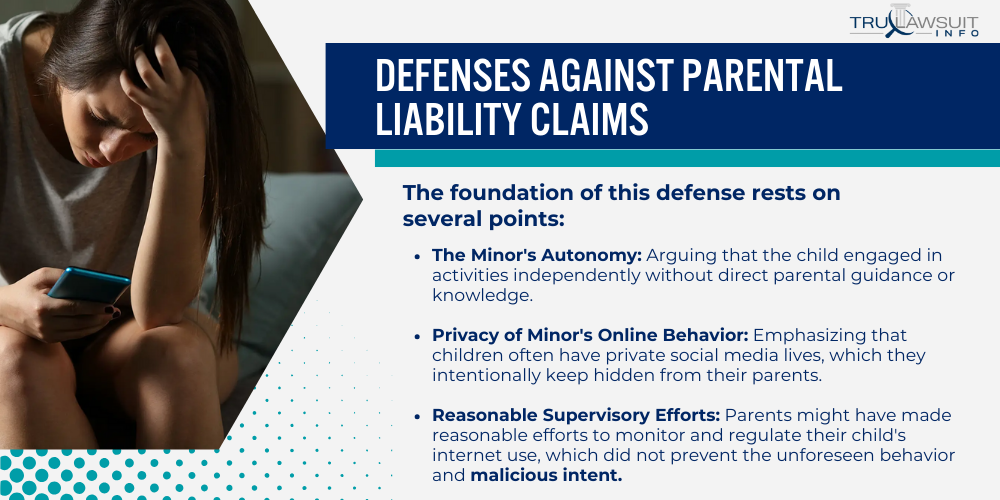
However, there are arguments and legal provisions parents can invoke to defend themselves against such allegations.
Arguing Lack of Knowledge or Control Over Child’s Actions
Parents may contend that they were not aware of their child’s online activities or had no control over these actions.
The foundation of this defense rests on several points:
- The Minor’s Autonomy: Arguing that the child engaged in activities independently without direct parental guidance or knowledge.
- Privacy of Minor’s Online Behavior: Emphasizing that children often have private social media lives, which they intentionally keep hidden from their parents.
- Reasonable Supervisory Efforts: Parents might have made reasonable efforts to monitor and regulate their child’s internet use, which did not prevent the unforeseen behavior and malicious intent.
- Limited Technical Understanding: This highlights a possible gap in the parents’ technical knowledge that inhibited their ability to effectively supervise their child’s online actions.
Invoking First Amendment Rights and Section 230 Protections
Parents may defend against liability by invoking the legal protections afforded by the First Amendment and Section 230 of the Communications Decency Act.
The critical aspects of these defenses include:
- First Amendment Rights: The claim that their child’s actions are a form of protected speech, hence not subject to certain liabilities.
- Lack of Publisher or Speaker Role: Underlining that parents did not create nor endorse the content shared by their child.
- Section 230 Safe Harbor: This provision may extend to protect certain parental actions from being held liable for their child’s online behavior.
- Good Faith Limitation: Arguing that any intervention by the parents to restrict or rectify their child’s online actions was done in good faith to comply with legal standards.
Strategies for Holding Parents Accountable
Parents play a pivotal role in monitoring and addressing their children’s online behavior.
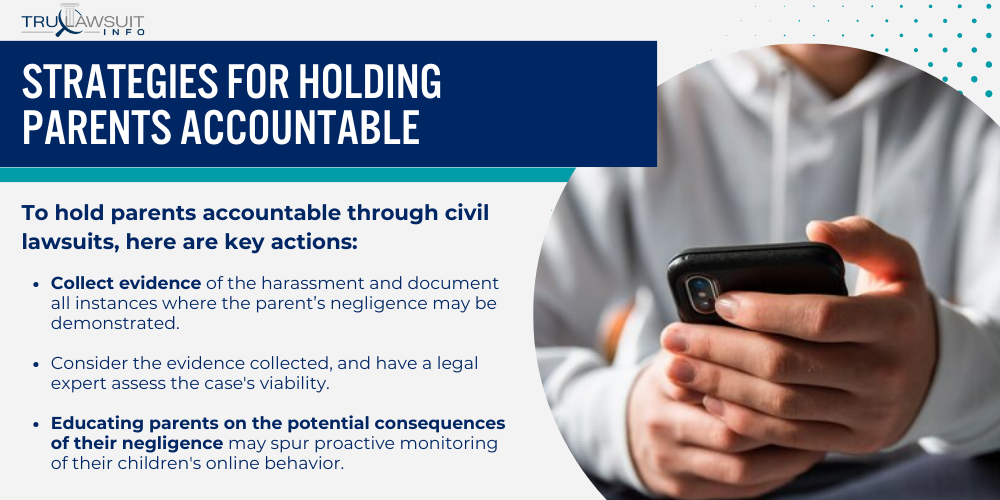
Holding parents accountable for social media harassment can be challenging but necessary.
Pursuing Civil Lawsuits Against Negligent Parents
Legal action is a deterrent and demonstrates the severity of overlooking children’s online activities.
To hold parents accountable through civil lawsuits, here are key actions:
- Collect evidence of the harassment and document all instances where the parent’s negligence may be demonstrated.
- Consider the evidence collected, and have a legal expert assess the case’s viability.
- Educating parents on the potential consequences of their negligence may spur proactive monitoring of their children’s online behavior.
- Guide the victims and their families on the steps to initiate legal proceedings.
Advocating for Stronger Laws and Penalties
Continuous advocacy can create robust laws that address parents’ responsibilities in preventing online harassment.
Strategies include:
- Lobbying legislators to draft new policies that hold parents accountable for their children’s online harassment.
- Partnering with educational institutions to create awareness programs for parents on the implications of social media harassment.
- Guiding policymakers by sharing insights into the complexities of online behavior and the role of parental supervision.
- Collecting and presenting data to showcase the impact of online harassment and the necessity for stronger parental accountability.
One can promote accountability and forge a safer online environment by focusing on these strategies.
Balancing Parental Responsibility and Free Speech Rights
With the rise of social media, parents face the challenge of guiding their children’s online interactions while respecting their rights, including issues surrounding sexual orientation and gender identity.
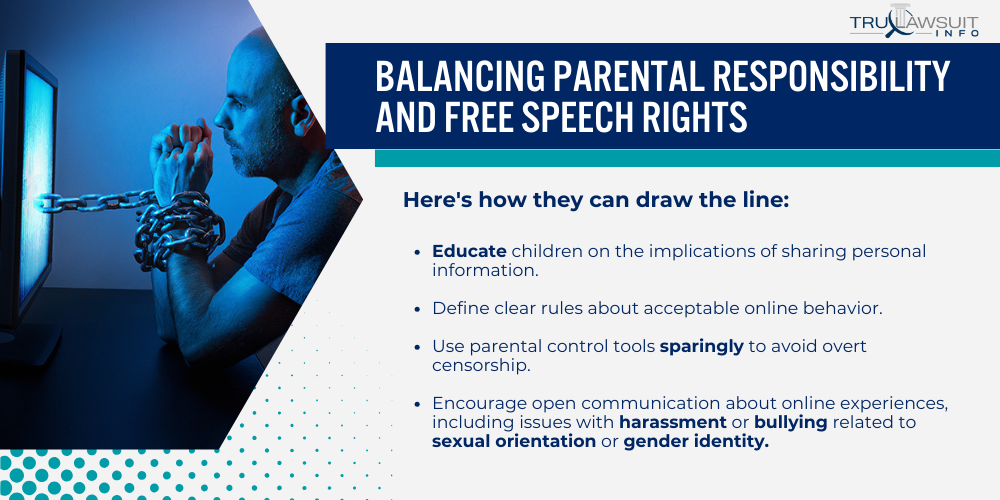
Lines Between Parental Oversight and Censorship
Parents play a pivotal role in monitoring their children’s social media activity to protect them from online harassment, yet they must also consider their children’s rights to free expression.
Here’s how they can draw the line:
- Educate children on the implications of sharing personal information.
- Define clear rules about acceptable online behavior.
- Use parental control tools sparingly to avoid overt censorship.
- Encourage open communication about online experiences, including issues with harassment or bullying related to sexual orientation or gender identity.
Encouraging Responsible Social Media Use Among Minors
Parents can foster responsible social media use without impinging on freedom of speech.
Here are ways forward:
- Model positive social media habits that children can emulate.
- Discuss the potential impact of one’s digital footprint.
- Highlight the importance of empathy and respect towards others, irrespective of sexual orientation, gender identity, or beliefs.
- Work with social media companies to understand the tools and policies that help create a safe online environment for minors.
Role of Social Media Platforms in Combating Harassment
Social media platforms are increasingly recognizing the importance of addressing online harassment and are taking steps to foster safer online communities.
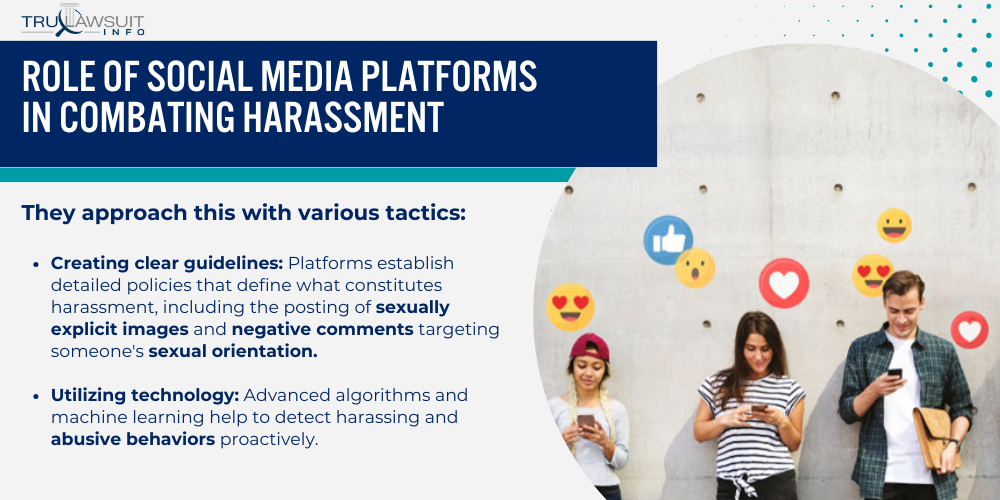
Implementing Effective Content Moderation Policies
Content moderation is a key strategy social media platforms employ to combat online harassment.
They approach this with various tactics:
- Creating clear guidelines: Platforms establish detailed policies that define what constitutes harassment, including the posting of sexually explicit images and negative comments targeting someone’s sexual orientation.
- Utilizing technology: Advanced algorithms and machine learning help to detect harassing and abusive behaviors proactively.
- Enabling reporting mechanisms: Users are provided tools to report inappropriate content easily and quickly.
- Providing transparency: Regular reports on enforcement actions give insights into the effectiveness of content moderation.
Collaborating with Law Enforcement and Victims’ Advocates
Partnerships with external entities enhance the effectiveness of a social media platform’s response to harassment.
These collaborative approaches aim to improve the response to social media harassment:
- Working With Law Enforcement: When online harassment escalates to threats or other illegal activities, platforms collaborate with police to address such issues.
- Partnering With Advocacy Groups: Expert organizations offer guidance on best practices and support victims of harassment.
- Creating Support Systems: Resources and tools are available for victims to manage the impact of group online harassment.
- Educating Users: Awareness campaigns help individuals understand how to protect themselves and where to seek help.
Through these measures, social media platforms take a proactive stance in mitigating the effects of online harassment and creating a safer environment for all users.
Tru Lawsuit Info: #1 Social Media Online Harassment Attorney
When looking for legal representation in cases of online harassment on social media, Tru Lawsuit Info stands out as a leading law firm.
They’ve built a strong reputation for their strategic approach to pursuing legal action against online harassment.
Their legal team is well-versed in the intricacies of Internet law, providing clients with the support necessary to handle these sensitive matters.
TruLaw offers expert analysis of online interactions, determined advocacy in and out of court, comprehensive support in collecting evidence for the case, and personalized services tailored to each client’s specific experience.
Our experienced attorneys work closely with clients to understand the scope of harassment, build a strong evidence-based case, and guide them through the appropriate legal channels while protecting their clients’ integrity and rights online.
TruLaw emphasizes the importance of taking quick action to prevent further harm in cases of social media harassment.
We encourage clients to keep detailed records of all interactions that could serve as crucial evidence.
The success of TruLaw is rooted in its commitment to the well-being of its clients, ensuring that they feel heard, respected, and, most importantly, protected under the law.
Frequently Asked Questions
-
What steps should be taken if you experience harassment on social media?
When experiencing harassment on social media, individuals should document the abuse by taking screenshots and preserving any communication.
It is important to refrain from engaging with the harasser.
The user should then block the perpetrator and report the incident to the social media platform according to its policy.
-
How can social media harassment be reported, and what are the consequences?
To report social media harassment, users should use the reporting tools provided by the platform.
The consequences for the accused harasser may include account suspension or banning from the platform.
If the harassment violates the platform’s terms of service, the incident may lead to further investigation.
-
What measures can individuals take to protect themselves from harassment online?
Users can safeguard themselves by adjusting privacy settings to control who sees their posts and limiting personal information shared online.
Additionally, using features such as two-factor authentication helps secure accounts against unauthorized access.
It’s also wise to be mindful of connections, accepting friends, or following requests from known individuals only.
-
In what ways does online harassment differ from in-person harassment?
Online harassment is unique in its potential for anonymity and pervasive reach.
Its effects can be amplified due to the speed and breadth with which information spreads online.
Unlike in-person harassment, it can occur at any time without needing the harasser and victim to be in the same physical space.
-
How do social media platforms handle complaints about online harassment?
Social media platforms typically have specific policies and reporting mechanisms in place.
Upon receiving a complaint, they review the content against their community guidelines.
Depending on the severity and nature of the harassment, action is taken, which can range from content removal to user account deactivation.
-
What legal options are available to victims of online harassment on social media?
Victims of online harassment may pursue legal remedies such as obtaining a restraining order against the harasser.
Depending on the jurisdiction, legal action can potentially be taken for defamation, privacy invasion, or cyberbullying.
It’s advisable to consult with a legal professional to understand the specific options available.

Experienced Attorney & Legal SaaS CEO
With over 25 years of legal experience, Jessie is an Illinois lawyer, a CPA, and a mother of three. She spent the first decade of her career working as an international tax attorney at Deloitte.
In 2009, Jessie co-founded her own law firm with her husband – which has scaled to over 30 employees since its conception.
In 2016, Jessie founded TruLaw, which allows her to collaborate with attorneys and legal experts across the United States on a daily basis. This hypervaluable network of experts is what enables her to share reliable legal information with her readers!
Have A Case?
Here, at Tru Lawsuit Info, we’re committed to helping victims get the justice they deserve.
To do this, we actively work to connect them with attorneys who are experts in litigating cases similar to theirs.
Would you like our help?
Tru Lawsuit Info is a reliable source of information about issues that may affect your health and safety, such as faulty products, data breaches, and environmental hazards.
Our team of experienced writers collaborates with medical professionals, lawyers, and advocates to produce informative articles, guides, and other resources that raise awareness of these topics.
Our thorough research provides consumers with access to reliable information and updates on lawsuits happening around the country. We also can connect consumers with attorneys if they need assistance.
Camp Lejeune's water contamination issue spanned several decades starting in the 1950s. Exposure to these chemicals has been linked to various serious health issues, including cancer, organ diseases, and death.
Research is increasingly suggesting a link between the use of Tylenol during pregnancy and the development of neurodevelopmental disorders, such as autism and ADHD, in infants.
Legal action is being taken against manufacturers of Aqueous Film-Forming Foam (AFFF), a chemical used in fighting fires. The plaintiffs allege that exposure to the foam caused health issues such as cancer, organ damage, and birth and fertility issues.
Have A Case?
Here, at Tru Lawsuit Info, we’re committed to helping victims get the justice they deserve.
To do this, we actively work to connect them with attorneys who are experts in litigating cases similar to theirs.
Would you like our help?







